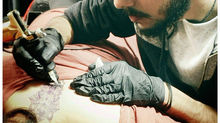The Dark Side of Drugs: How They Can Affect Tattoo Artists’ Creativity and Precision
- inkscool
- Sep 18, 2023
- 2 min read
Tattooing is an art form that requires both creativity and precision. Tattoo artists rely on their ability to create beautiful and intricate designs while maintaining steady hands to ensure a clean and precise execution. However, there is a disturbing trend in the industry where some artists turn to drugs in the pursuit of enhancing their creativity. In this blog, we’ll explore how the consumption of drugs in the quest for creativity can actually lead to a deterioration in creative thinking ability, reduce the stability of hands while tattooing clients, and ultimately prove detrimental to tattoo artists.
The Illusion of Creativity
Many artists mistakenly believe that drugs can unlock a new realm of creativity, allowing them to generate groundbreaking ideas and designs. While it’s true that some drugs can temporarily alter perception and induce feelings of euphoria, they often come with significant downsides. For instance, drugs like marijuana and psychedelics can impair memory, concentration, and logical thinking, hindering the artist’s ability to conceptualize and plan their designs effectively.
Creativity is not solely about producing novel ideas; it also involves the ability to execute those ideas skillfully. The use of drugs can disrupt this delicate balance, leading to a disconnect between inspiration and execution.
Precision and the Unsteady Hand
Tattooing requires steady hands and impeccable precision. Any tremors or instability can result in mistakes that are permanent and painful for the client. Unfortunately, drug use can significantly compromise a tattoo artist’s physical dexterity and fine motor skills.
Stimulants like cocaine and amphetamines may provide a temporary burst of energy but often lead to jittery hands and increased heart rate, making it challenging to maintain control during the tattooing process. Additionally, drugs like opioids can cause drowsiness and a lack of focus, which are equally detrimental to an artist’s ability to work with precision.
Client Safety and Well-being
Beyond the impact on creativity and precision, the use of drugs by tattoo artists raises significant concerns about client safety. Tattooing is a practice that involves the risk of infection, injury, and permanent scarring if not performed with utmost care and hygiene. Drug use can impair judgment, leading to poor decision-making during the tattooing process, potentially endangering clients’ health.
Furthermore, an artist under the influence of drugs may neglect crucial safety protocols, such as proper sterilization and hygiene, which are vital in preventing infections and complications.
Conclusion
While the allure of using drugs to enhance creativity may be tempting for some tattoo artists, the risks far outweigh any perceived benefits. Drug consumption can lead to a deterioration in creative thinking ability, reduce the stability of hands while tattooing clients, and pose serious risks to client safety and well-being.
Instead of turning to substances, tattoo artists should focus on cultivating their creativity through healthier means, such as seeking inspiration from diverse sources, collaborating with other artists, and continuous practice. Creativity and precision in tattooing are skills that can be honed and perfected without resorting to substances that ultimately jeopardize both the art form and the well-being of clients. It’s essential for artists to prioritize their own health and safety, as well as that of their clients, to ensure the longevity and integrity of their craft.




































Comments